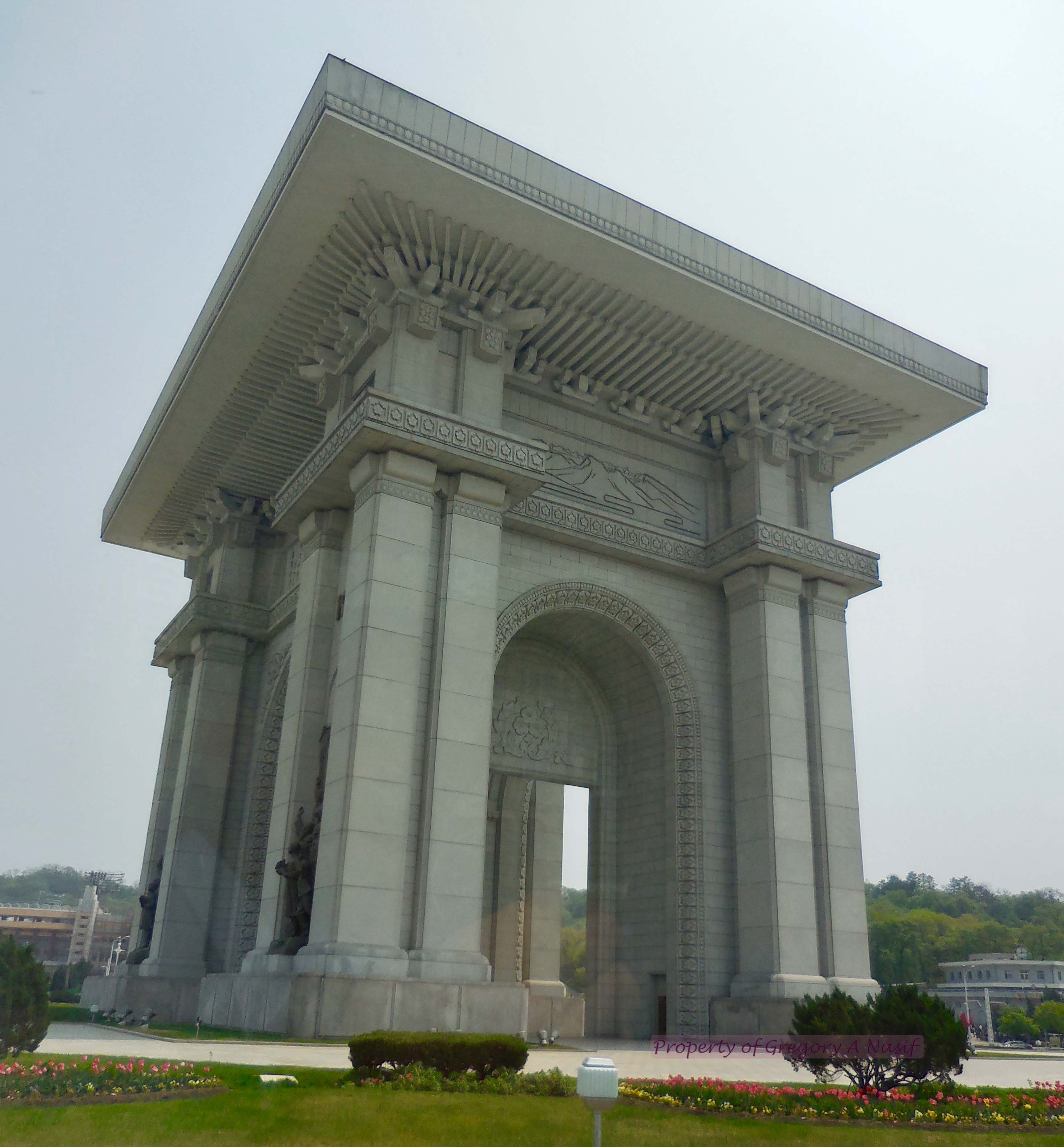
The Arc of Triump
No turning back now.
Stepping out of the gate at the small Pyongyang International Airport, there was no indication of what to do next. For a moment this felt like a gross oversight.
Luckily it only took a few seconds to spot what must have been the Koryo Tours group (read: white people). Within a half-hour I was onboard a bus with the first eight of my ‘tourmates,’ my two North Korean tour guides, Mr. Hang and Ms. Jeon, the first talkative and jovial, the second patient and informative. We also had a Western tour guide, a German woman. I was too glued to the window to consider being grateful that most of them were young people like me.
It was the weirdest bus ride I ever took.
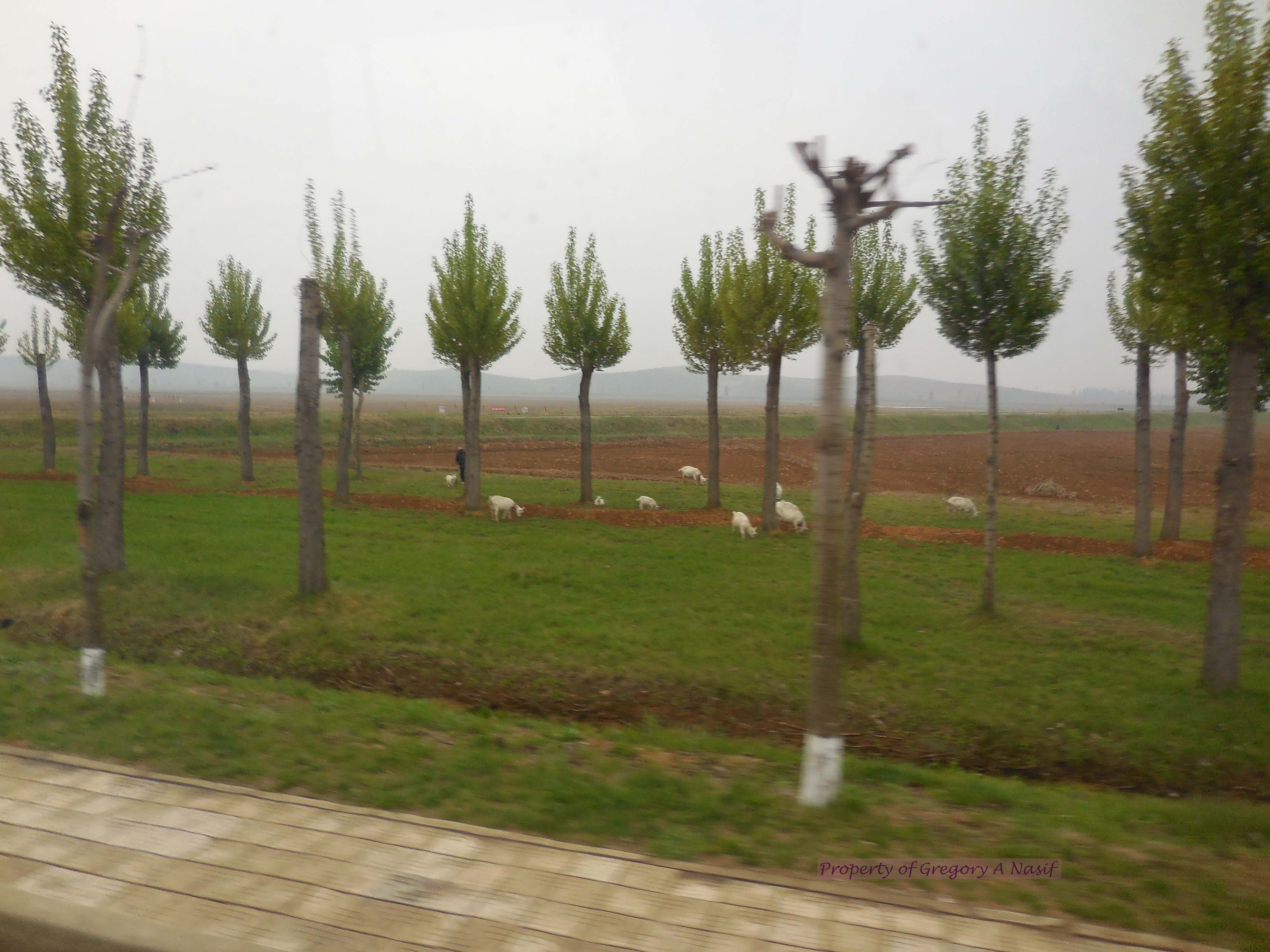
Farmland near Pyongyang International Airport
From the moment we left the airport in a muddy green outcrop of Pyongyang, there were pedestrians outside walking. As we approached the city, there were few cars but more and more people. This was the first surprise, as I kind of imagined Pyongyang as a big empty city.
The people were all of the same mold. Skinny and simple. No one seemed to be starving, but no one was overweight either. Their clothes reflected conservative styles of the mid-20th century. The men often wore basic army attire, and the women most often long dresses or knee-length skirts. Some rode vintage bicycles, most walked. Every single person wore a pin on their shirt or blouse, featuring the faces of one or both of Kim Jong-il and Kim Il-sung, like the entire nation was pledging a fraternity.
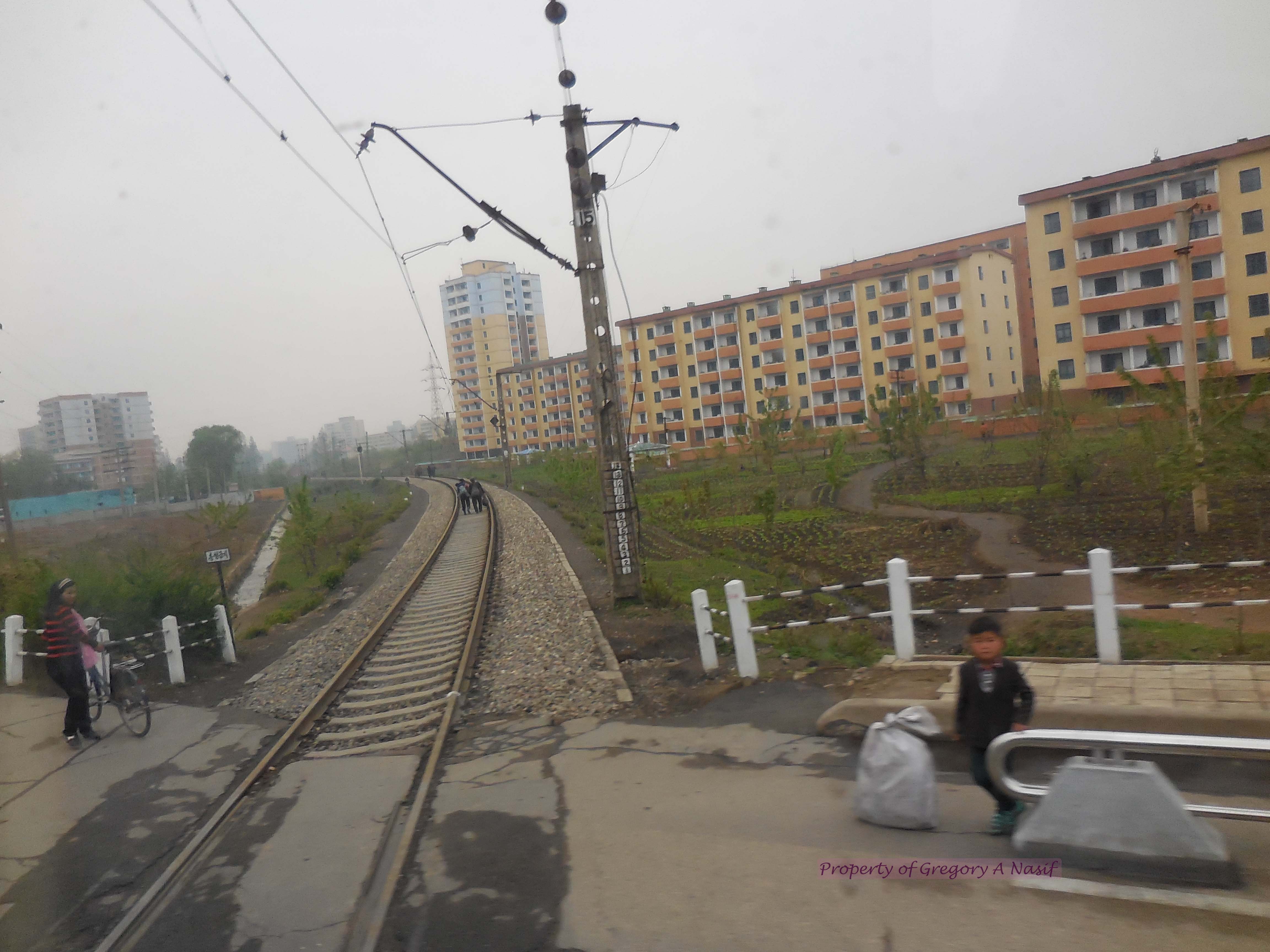
Train crossing near Pyongyang
We had barely left the airport when Ms. Jeon began her tour, explaining the rest of the day’s itinerary.
“… and next we will pick up the other travelers at the train station,” she was saying in her soft, innocent voice. “On the way, we will stop at the Arc of Triumph, a landmark in Pyongyang City.”
Pause.
“Can you tell us about the Arc of Triumph?” I asked, unable to contain myself.
Ms. Jeon looked at me with what would become a characteristic deadpan. My very soul recoiled. “We will explain it when we are at the site,” she said.
This was immediately followed by a hiss, a cringing “oooooo,” some laughter, and a pat on the back from other tourmates. “Nice try, buddy,” one muttered. Ms. Jeon may have felt bad; speaking a foreign language leads to tonal misinterpretations quite often.

So she changed tack.
“Well, when President Kim Il-Sung rallied the Korean people and expelled the Japanese imperialists, we wanted to commemorate his heroic and glorious victory and the sacrifice of many martyrs. He declared that we must honor and respect the martyrs with a large monument to our victory.”
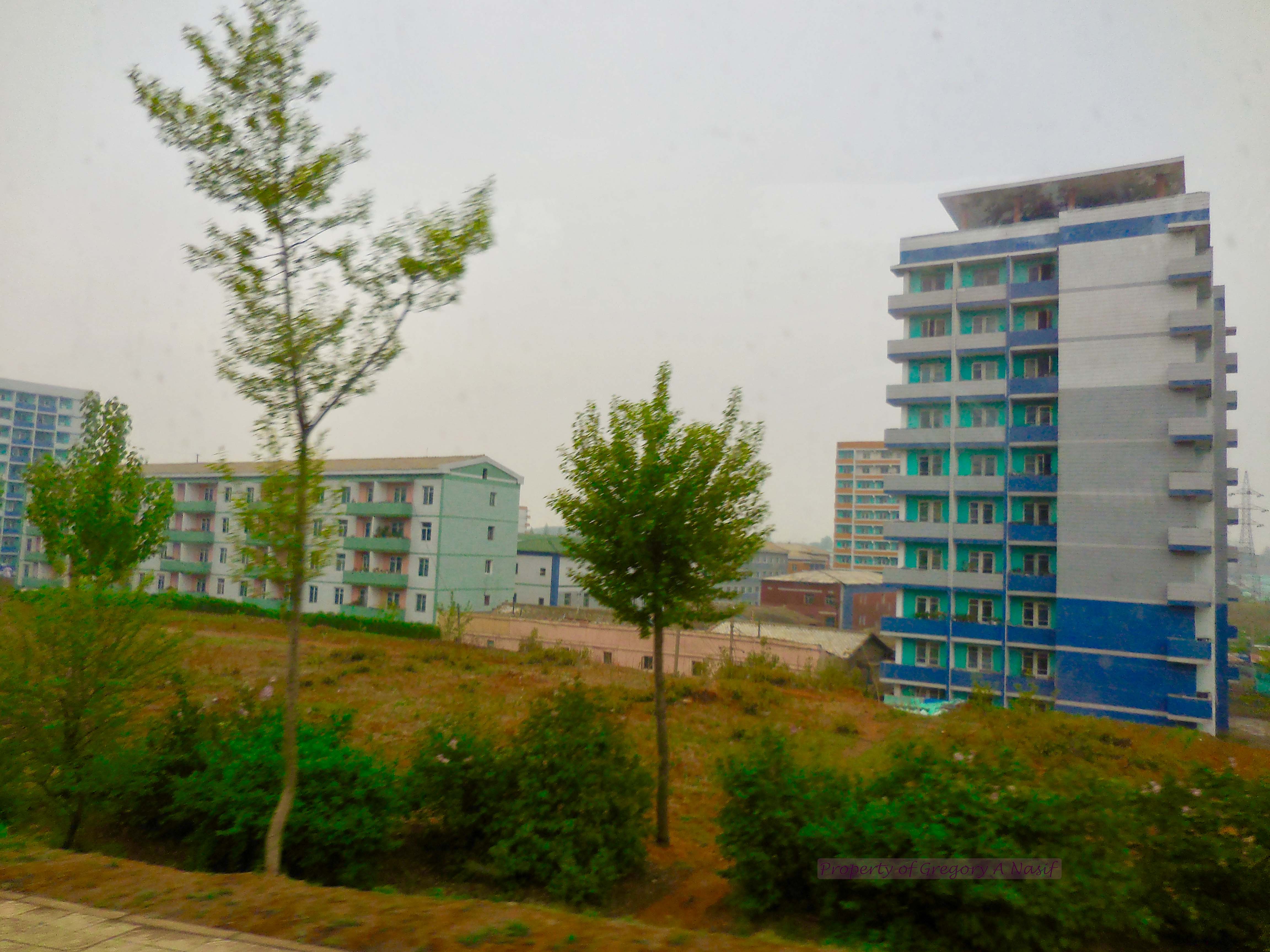
She delivered this answer straight to my big-nosed imperialist face, as the bus fell into a surreal silence. This was a moment I was glad no friend or family member was present. Never in all my life did I work so hard to keep a straight face.
“Interesting,” I managed, deflecting attention away. I must remember to laugh later, I thought, worrying about remembering this moment at the wrong time.
Changing the subject, someone asked about the pins.
“There is no difference,” Ms. Jeon said about the varying pins. “They show the faces of our leaders, and that we are all equal in our respect for him.”
Back to the window.
Most of the buildings were old, with peeling paint, some even looked abandoned. But a few, especially downtown, were mammoth beauties, with boldly stylistic design and neon lighting that seemed to play with North Korea’s ominous image. The impressive buildings looked futuristic and imposing. No doubt wondering who was privileged enough to live in these towers, another tourmate asked, “Where does Marshal Kim Jong-Un live?”
The guides responded, somewhat coldly, that they don’t know. We soon realized personal information about the leaders was generally considered taboo.
The first stop was Pyongyang Station. A few of our number had arrived on the overnight train from Beijing.
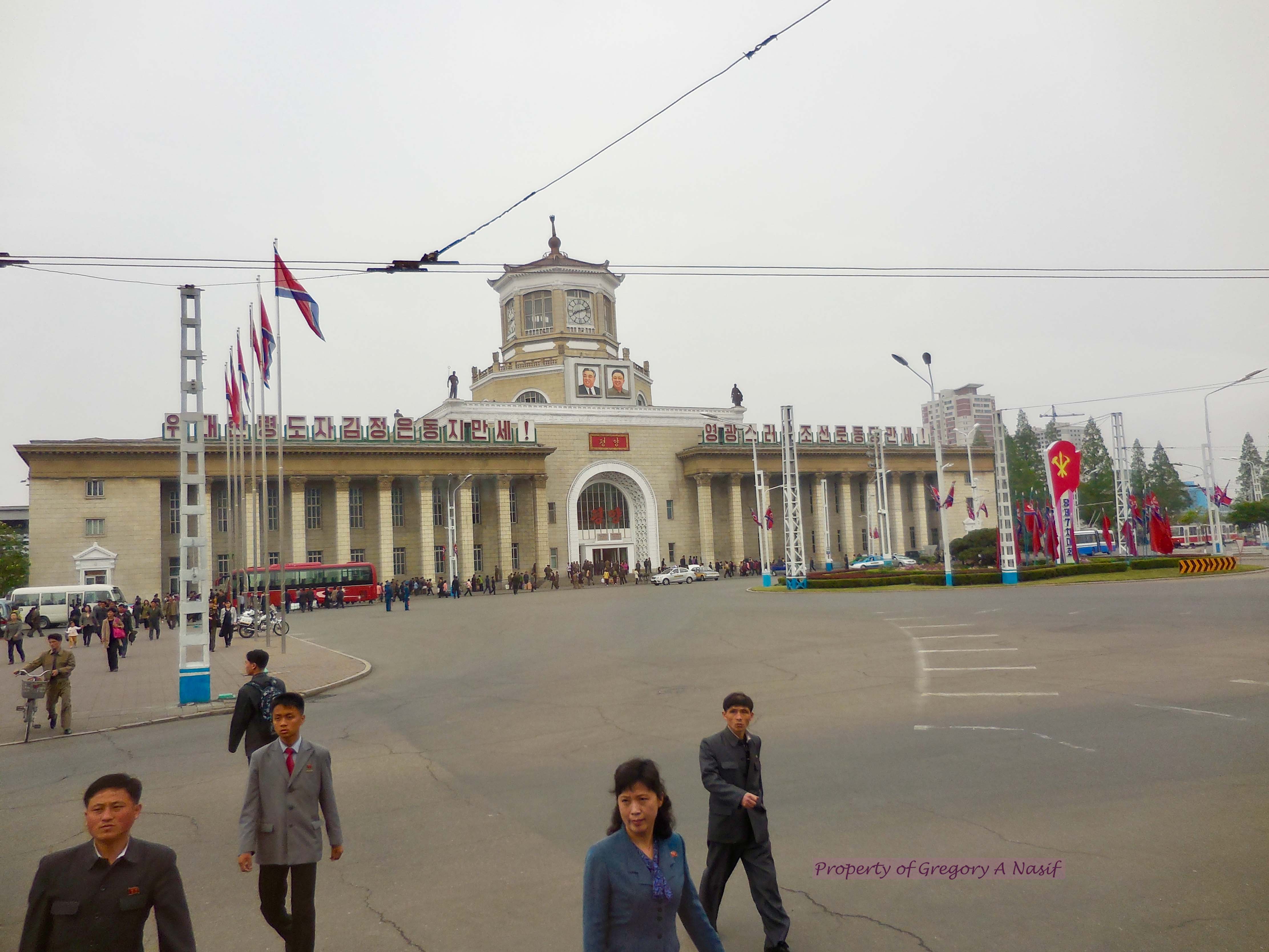
There was a feel to this train station, that it was the pride of the city, the center of that technological miracle that propelled a century of worldwide growth at a time when economic progress became the center of every political party doctrine. It looked like it was printed right out of the propaganda press, and as if it hadn’t aged a day since 1950.
As my tourmate Berkay so aptly stated, our plane wasn’t a plane at all – it was a time machine.
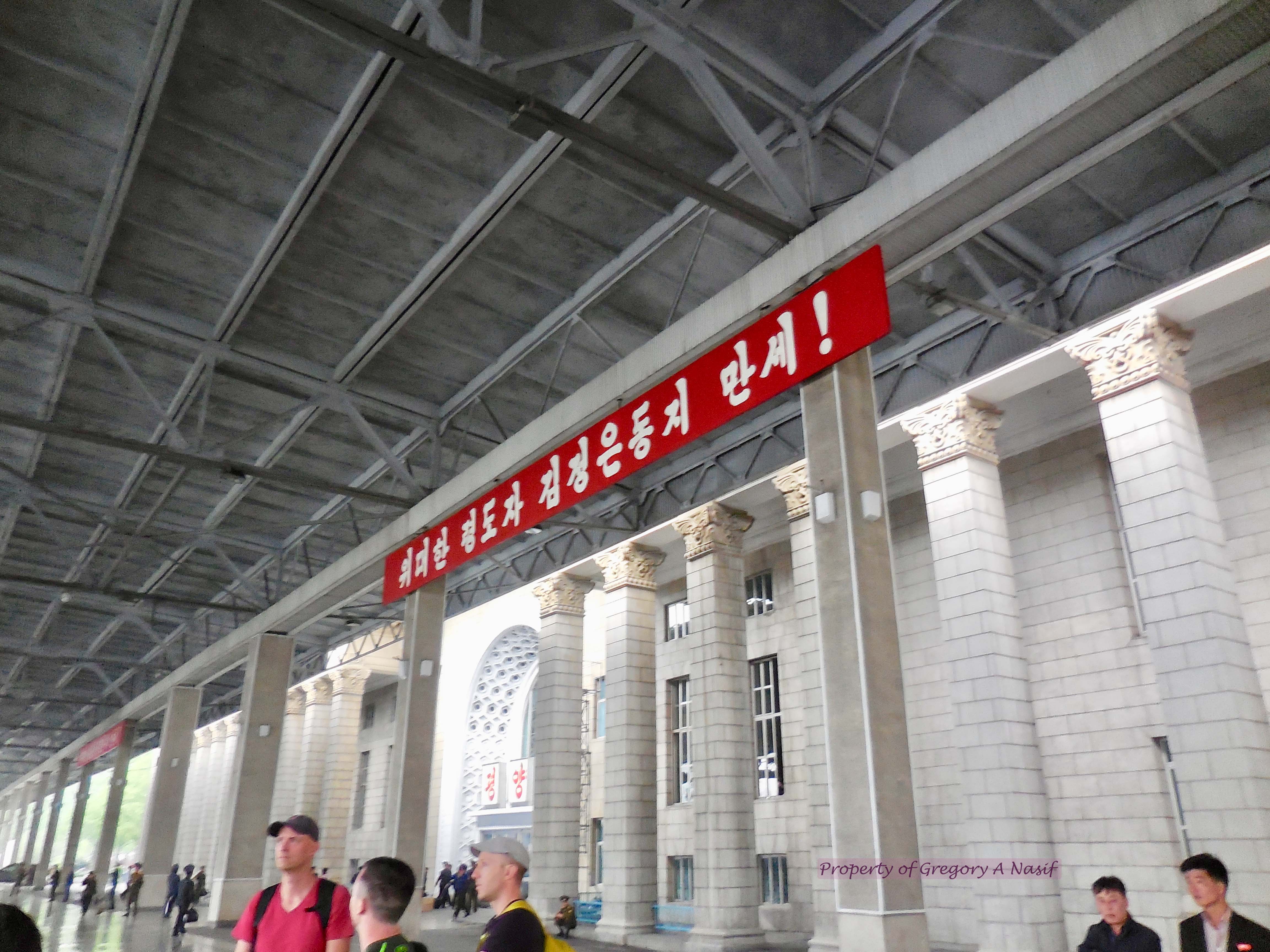
The square beside the pickup lane was rather crowded with people, mostly men, watching a megascreen that was propped up on the edge of the square, broadcasting afternoon ‘news.’ The men were doing nothing else, besides standing and watching, as if they had walked all the way here from home just to do this. Maybe it’s being a son of the cellphone age, but it was unsettling – more so when several of these men turned their attention toward us, eyeing our tour group with something between distaste and hatred.
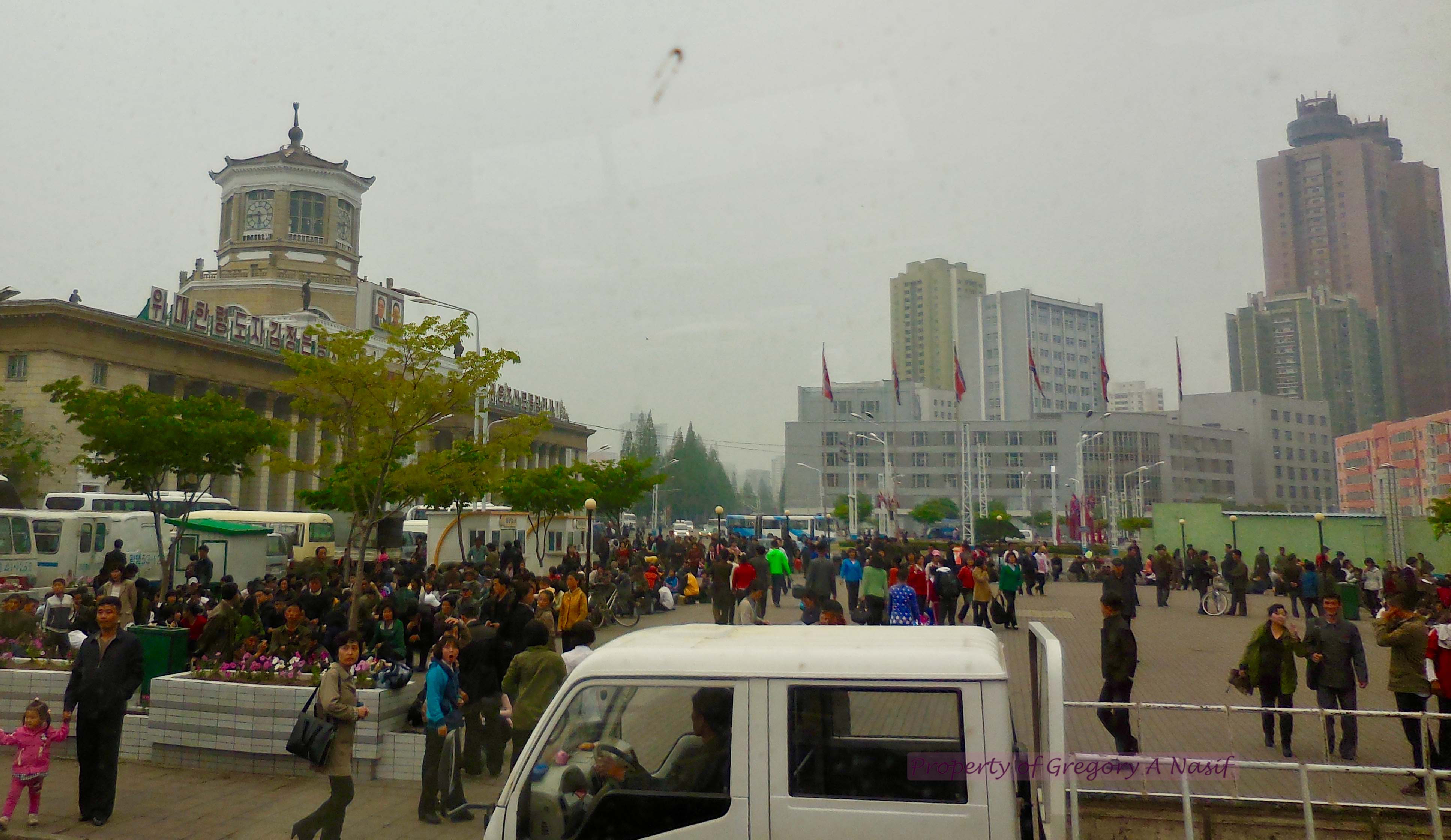
For here we were, foreigners, out in the open, in a major public square in Pyongyang. Any pedestrian could, if they wanted, have walked right up to us. It felt like the walls at the zoo had come down. And yet not a single tourist was bitten or clawed as we followed Mr. Hang waltzing toward the station doors, knowing we could not legally be alone anywhere. I cannot describe the feeling – freely walking in an unfree country. The ten seconds to the gate felt like thirty minutes.
Army soldiers on guard inspected Mr. Hang’s credentials and let us through, they alone not looking once at the group of foreigners following behind him.
Inside the station were books in many languages, with English titles like Kim Jong Il – The Great Man or Work of Leader Kim Jong-Un in the Year 2012. Pictures of the first two leaders were everywhere.
After picking up the remainder of our group, we stopped once again at the Arc of Triumph, where Mr. Hang spoke more of Kim Il-Sung’s liberation of North Korea from Japanese Imperialist forces. Apart from the name Kim Il-Sung, his speech did not sound much different than the history I was taught a year earlier in South Korea. Then he mentioned that the Arc also commemorates the North’s “victory” in the Korean War – or the “Fatherland Liberation War.” I did not challenge his narrative, knowing the opportunity to do so would return when I better understood the country, the people… the nature of the beast.
Last stop was our hotel, which was something like a fortress in the middle of the city. The Yanggakdo International Hotel is where every foreigner in Pyongyang seems to be interned stay. Tourists are not allowed to leave at night under any circumstances. Even if they did, the towering hotel stands on an island, in the middle of the city. There is no escape.
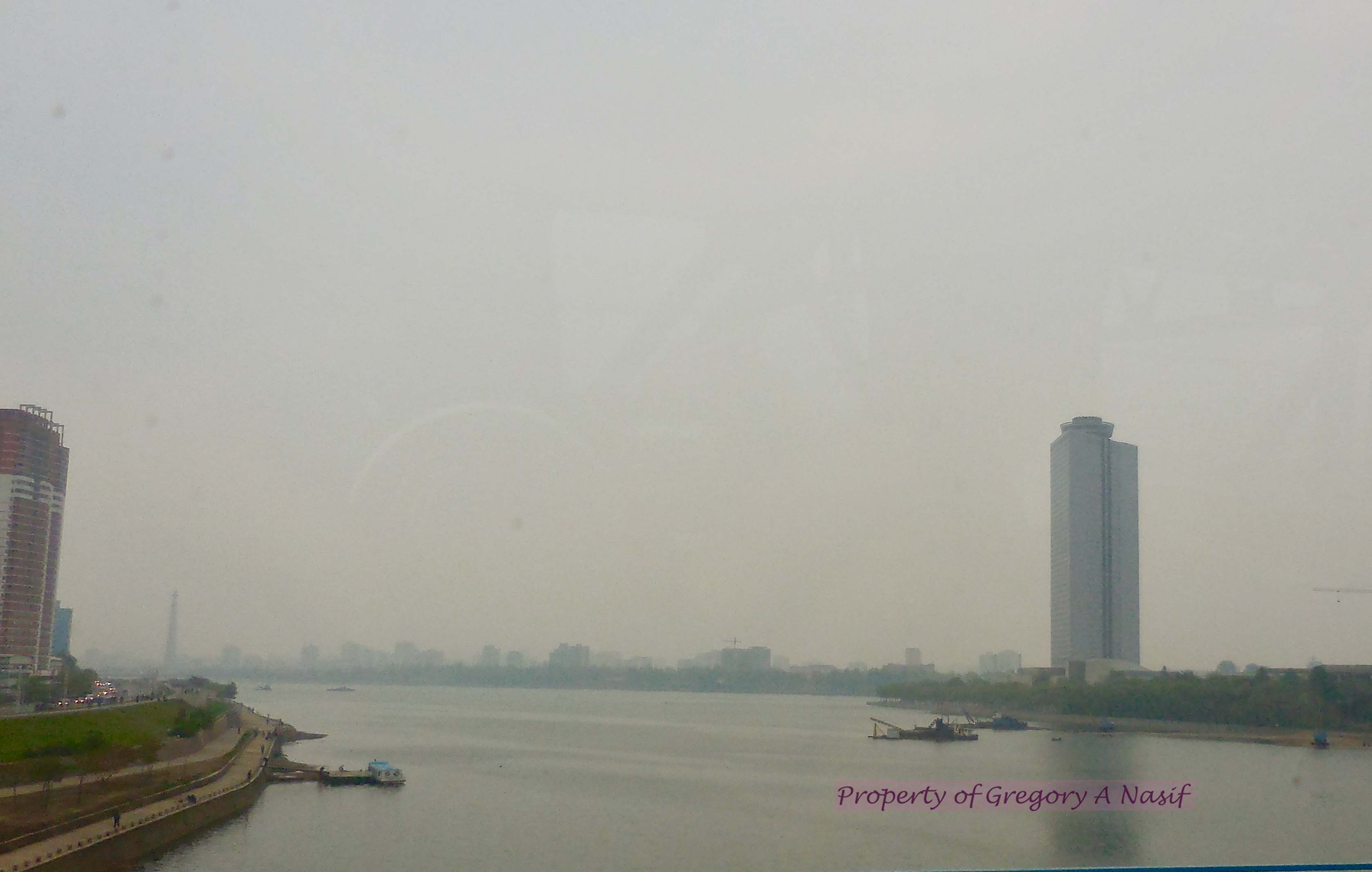
The Yanggakdo International Hotel, with the Juche Tower in the background.
Because of this, the hotel is actually quite well-supplied with various forms of leisure, including a karaoke room, a bowling alley, and a number of bars and restaurants. Our first dinner was at the hotel. Big bottled beers were fifty cents. The food was a bit bland, but some of it was delicious, and there was too much of all of it.
After dinner, the group went to a bar next to the lobby. And for a while, we struggled to feel normal. Usually tourists abroad talk about their travels. The group would talk about other countries we’d visited, but we were under the implied threat of uninvited listeners. Even veiled references to anything about North Korea were often met with nervous laughter and awkward silences, derailing the conversation.
So we ordered more beer.
Several bars in the vicinity were somewhat woven together, and they all slowly filled. Soon the area was full of drunken foreigners from many tour groups, and a few cheery North Korean waitresses and bartenders.
“This place is definitely bugged,” I said at last to my neighbor, an older Irish man. He smiled.
“They wouldn’t miss the chance,” he agreed.
“Doesn’t mean there’s somebody listening. Who has time for all that?”
The thought that the uninvited listener might be in a control room with twenty muted speakers, sleeping his shift away, gave us a little more confidence. The laughter many of us had bottled up earlier began to erupt.
For all the notorious arrest stories most of these travelers had read before coming, we’d never heard of one centering around foreigners’ private conversations. And for all the fifty-cent beers being sold to a hotel full of surprisingly young Europeans, Australians, Americans, Canadians, and others, and all the rants the tourists kept to themselves all day until swilling through these bars, they’d have a lot of arrests to make.
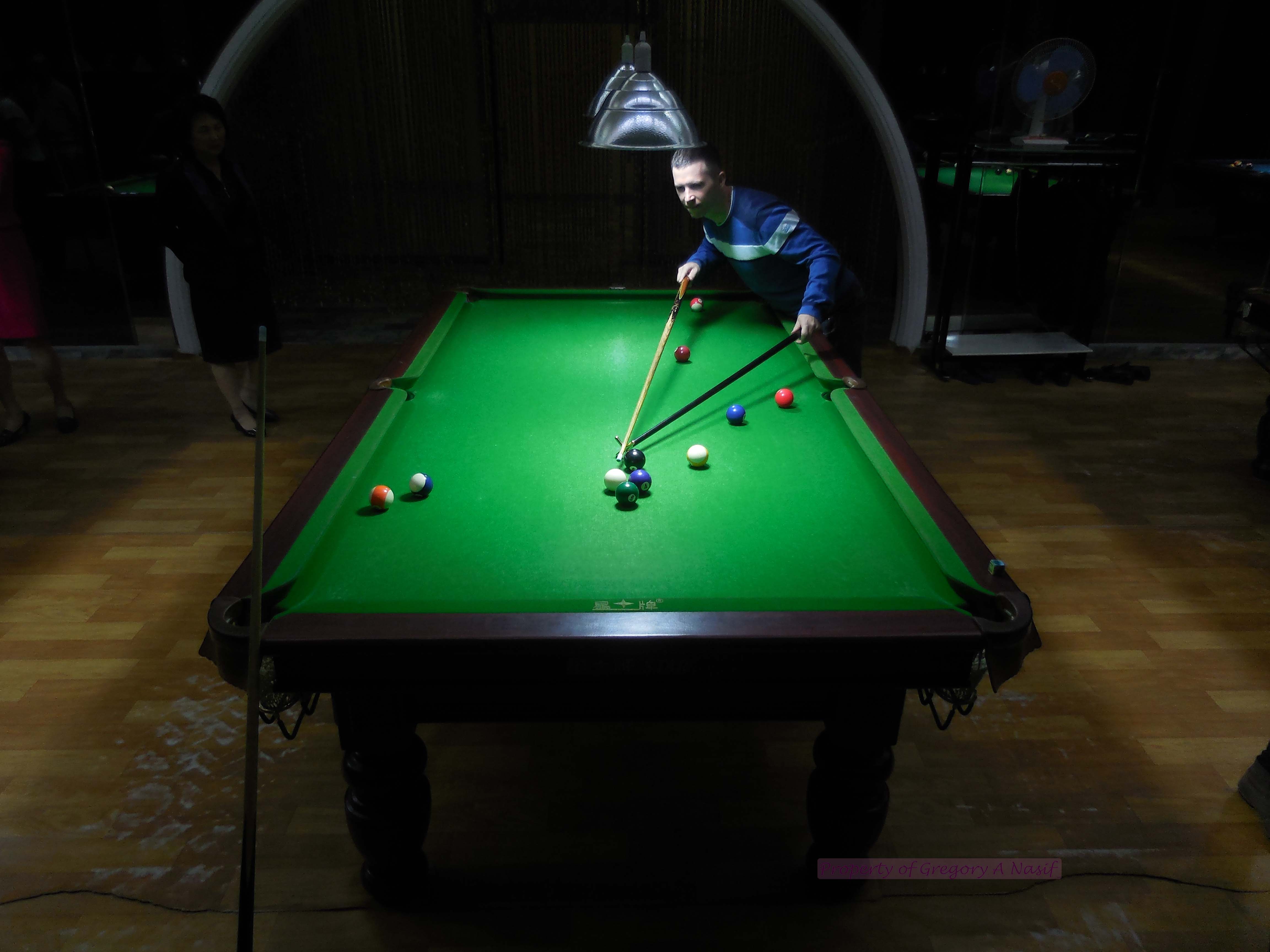
Roger, Yanggakdo Hotel.
After the lobby bar a few of us went to a billiards bar in the basement, where a North Korean barmaid taught me to count to ten in Korean, then smashed me in a game of 8-ball. For the first time since I’d come to Japan, I felt like a true frontiersman once again.
It would be an early morning the next day – we were scheduled to visit the Kumusan Palace of the Sun and see the embalmed and preserved bodies of Kim Il-Sung and Kim Jong-Il. Before going to bed, I wrote a coded journal entry, and marveled at the view from my room – it was half of Pyongyang, pitch black except for the brightly lit Juche Tower.
I pondered the events of the day.
Above: Ri Chun-Hee, covered on CNN
Most memorable was the moment we arrived at the hotel. While waiting in line to check in, I had pointed to the TV screen, where an anchorwoman, Ri Chun-hee, was telling the news of the day. “I know that woman,” I had said. “I thought she retired?”
Mr. Hang was shocked. “Yes, why do you know that? How do you know her?”
I hesitated to answer. Because she’s the crazy face of your crazy country.
“I saw a video…” I said.
“A video?”
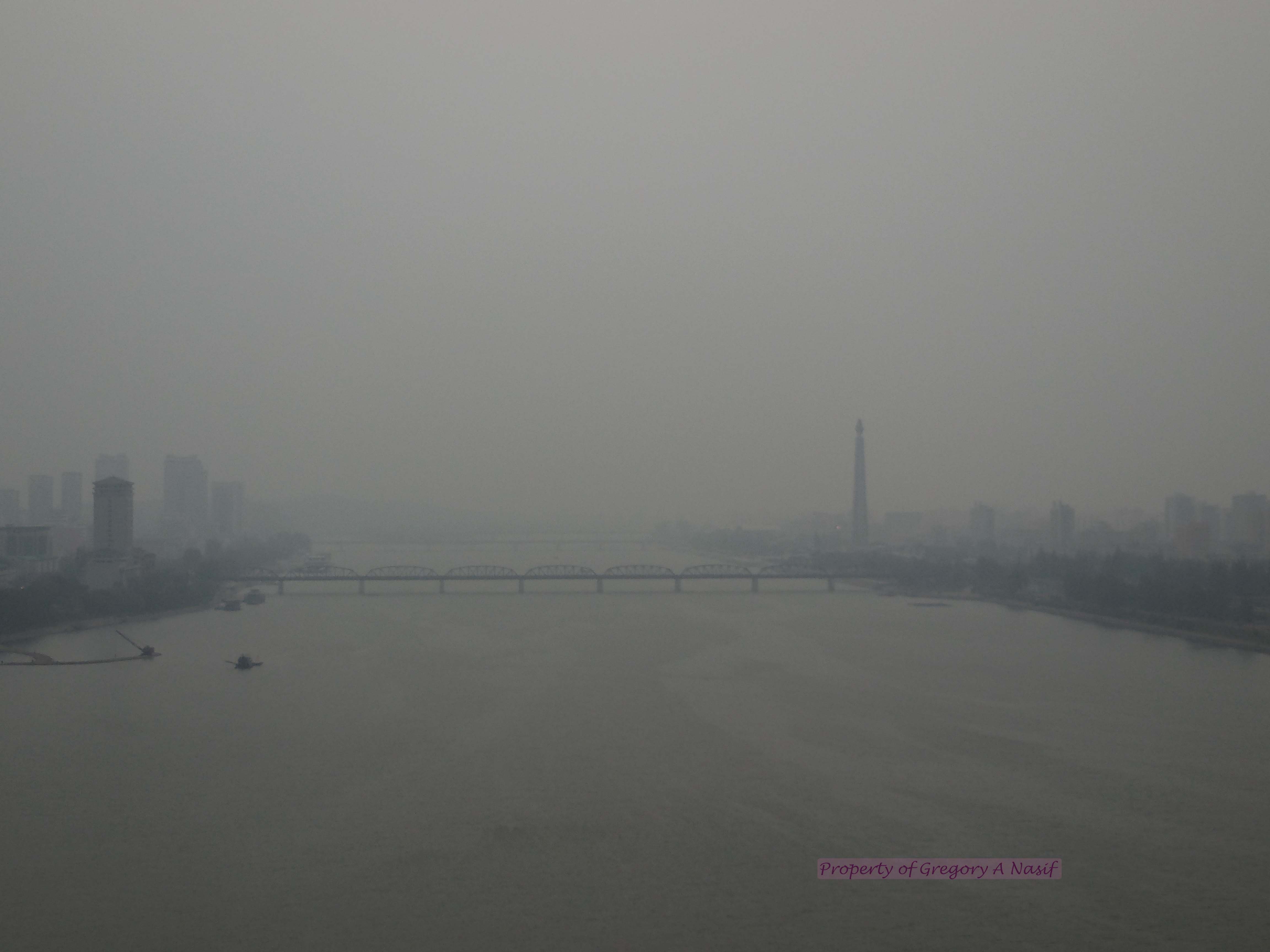
“On the internet”
“Internet?”
I took a deep breath. “When Kim Jong-Il passed away, it was big news in America.”
“Yes,” said Mr. Hang, understanding at last. “Sad day.”
It was the most awkward silence of my life.
Then it occurred to me I may well be insulting his memory of someone he deeply loved, whomever that person was to me. I offered my condolences.
“It’s okay” said Mr. Hang with sincerity. “You don’t know much about DPRK.”
“I’ll learn more,” I said, playing along. “That’s why I’m here!”
“Yes!” he exclaimed. “Exactly! That’s why you come! I will teach you.”
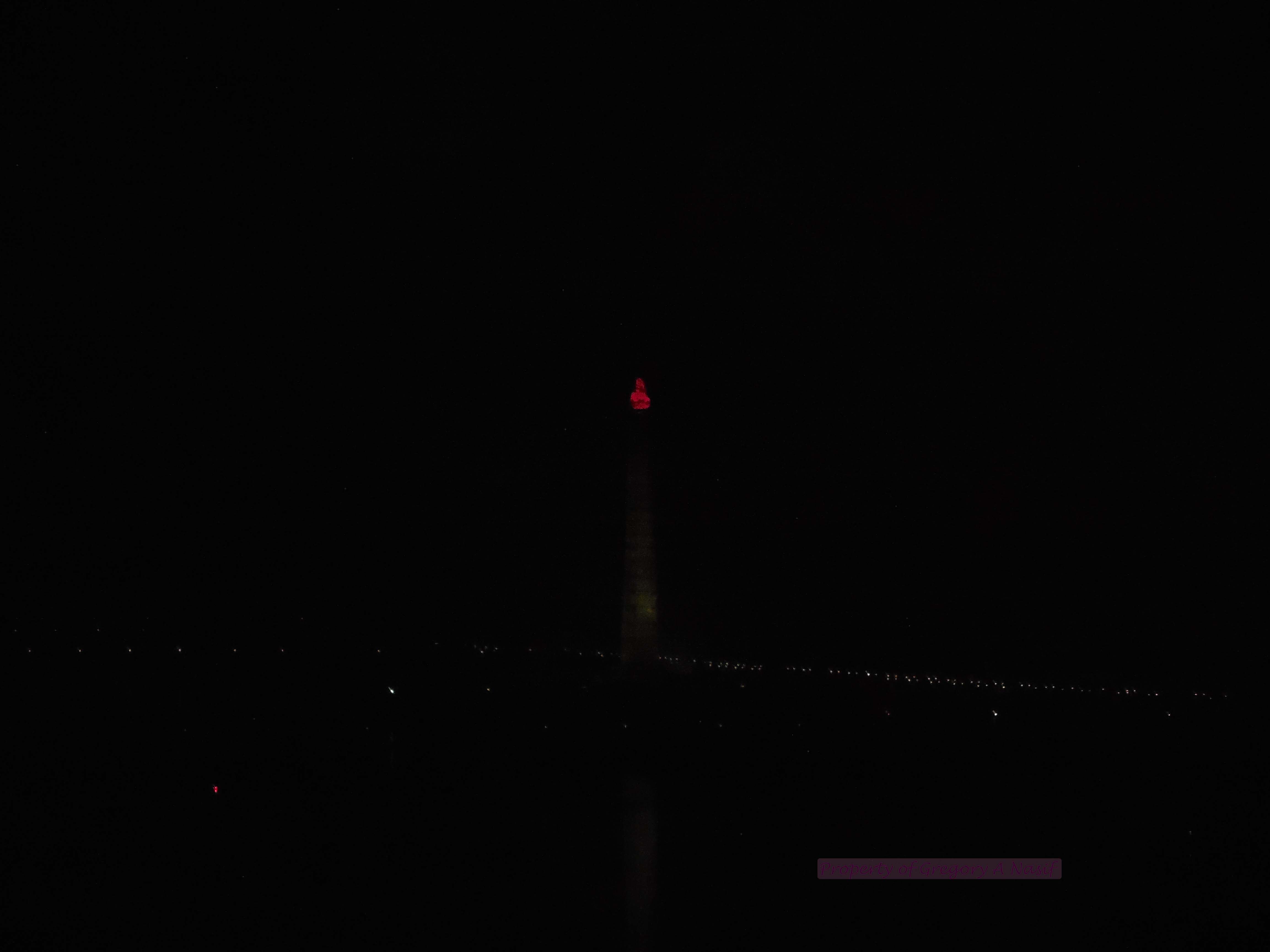
I came out of my reverie and stared at the Juche Tower ahead. The ominously bright tower and glowing red torch, towering over a pitch-black city, seemed so emblematic of a nation kept in the dark except for the state ideology.
It had been just ten hours since I arrived in the country. But that the rest of the planet still existed beyond this perimeter was unbelievable to me. There was only the torch, and the world it pretended to illuminate for its people.
To be continued.
More photos:

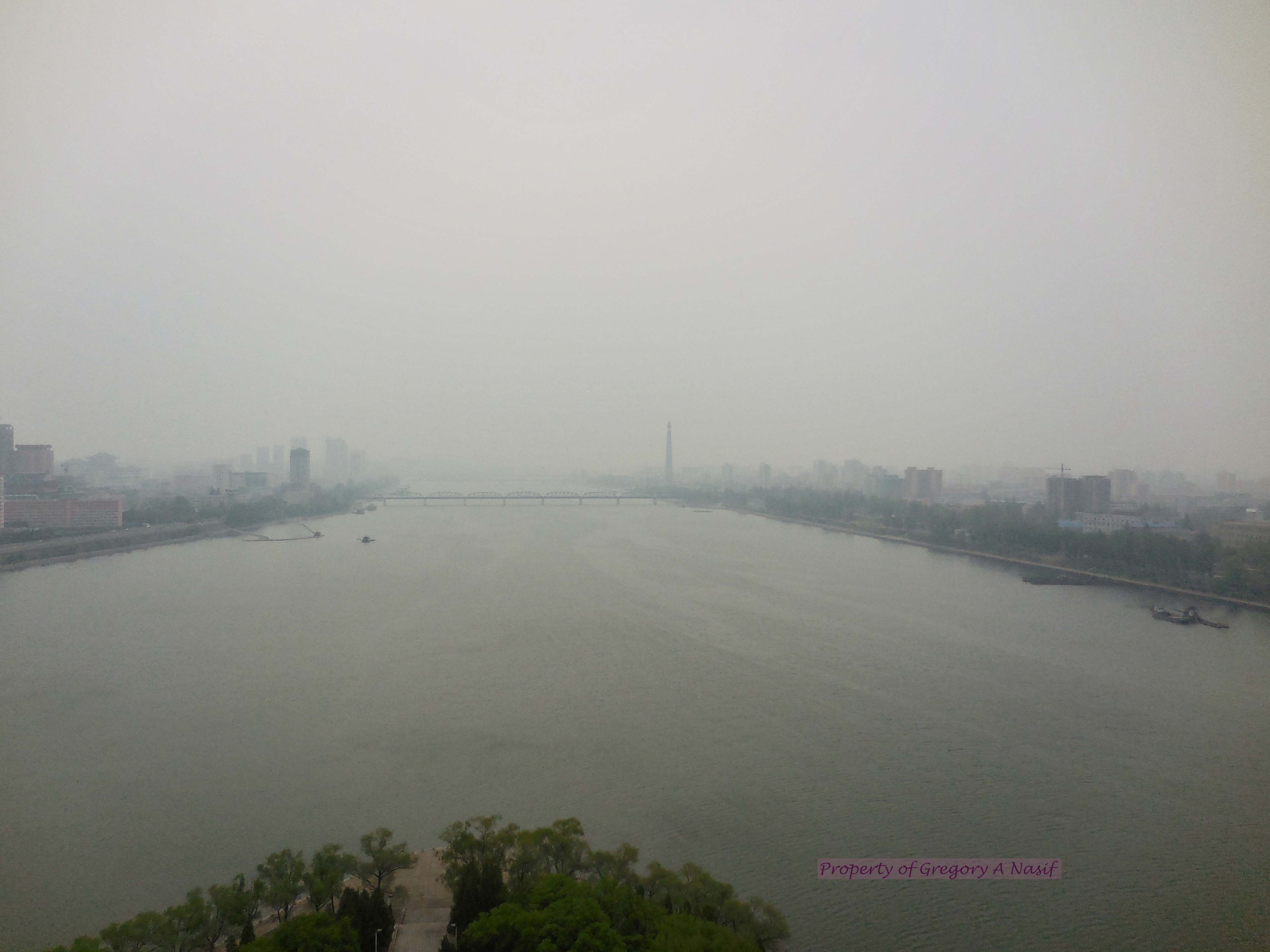
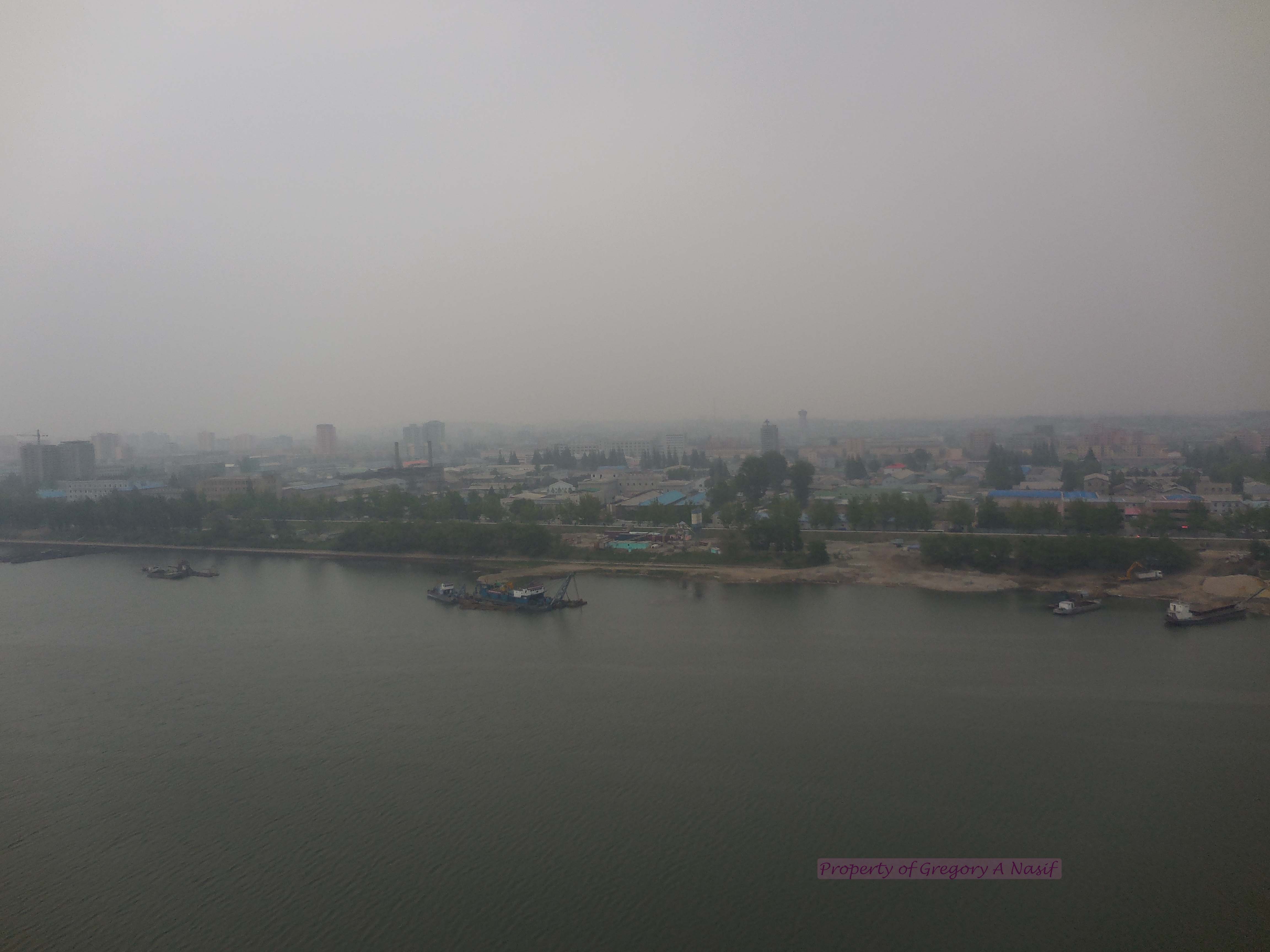

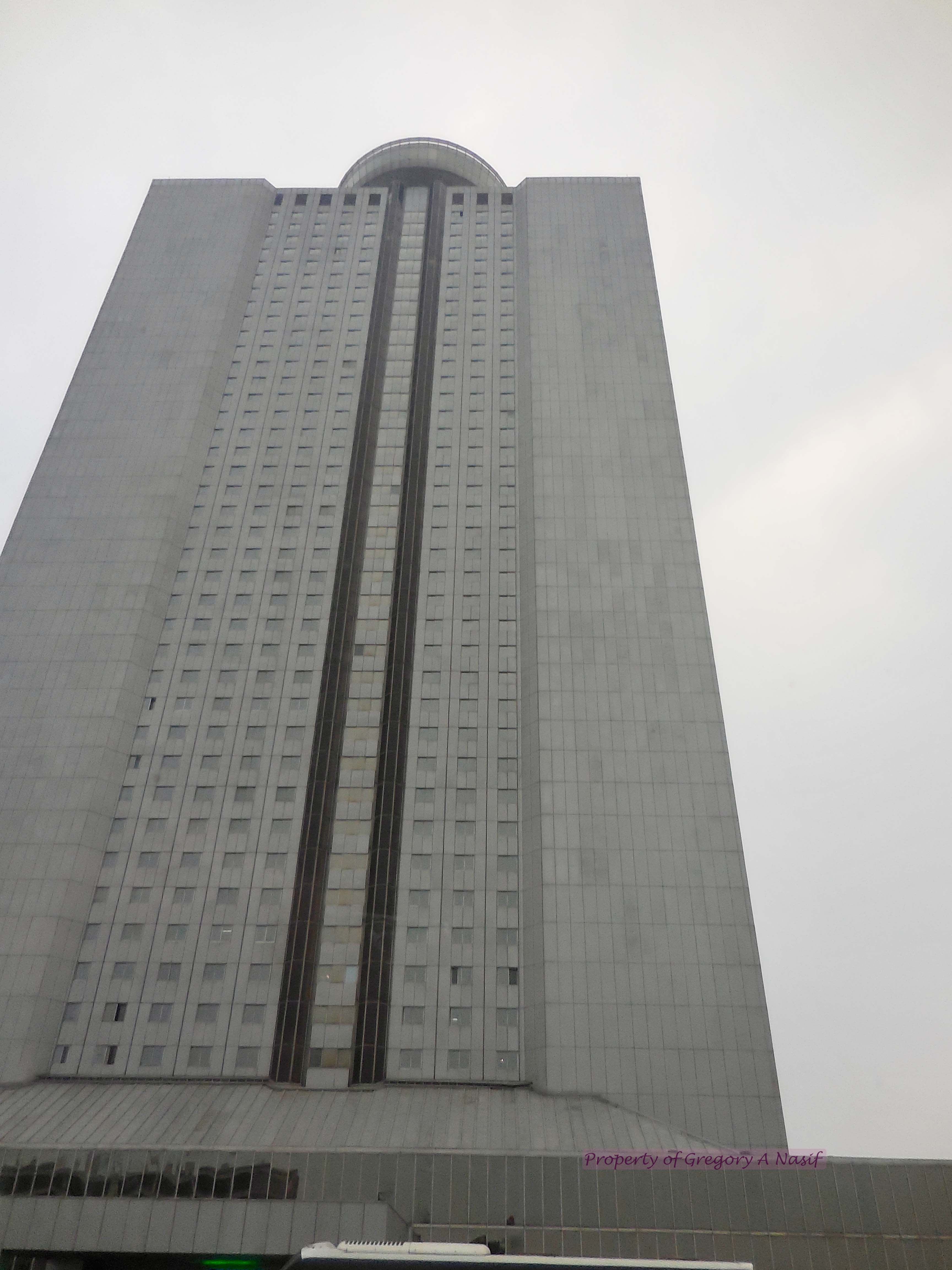

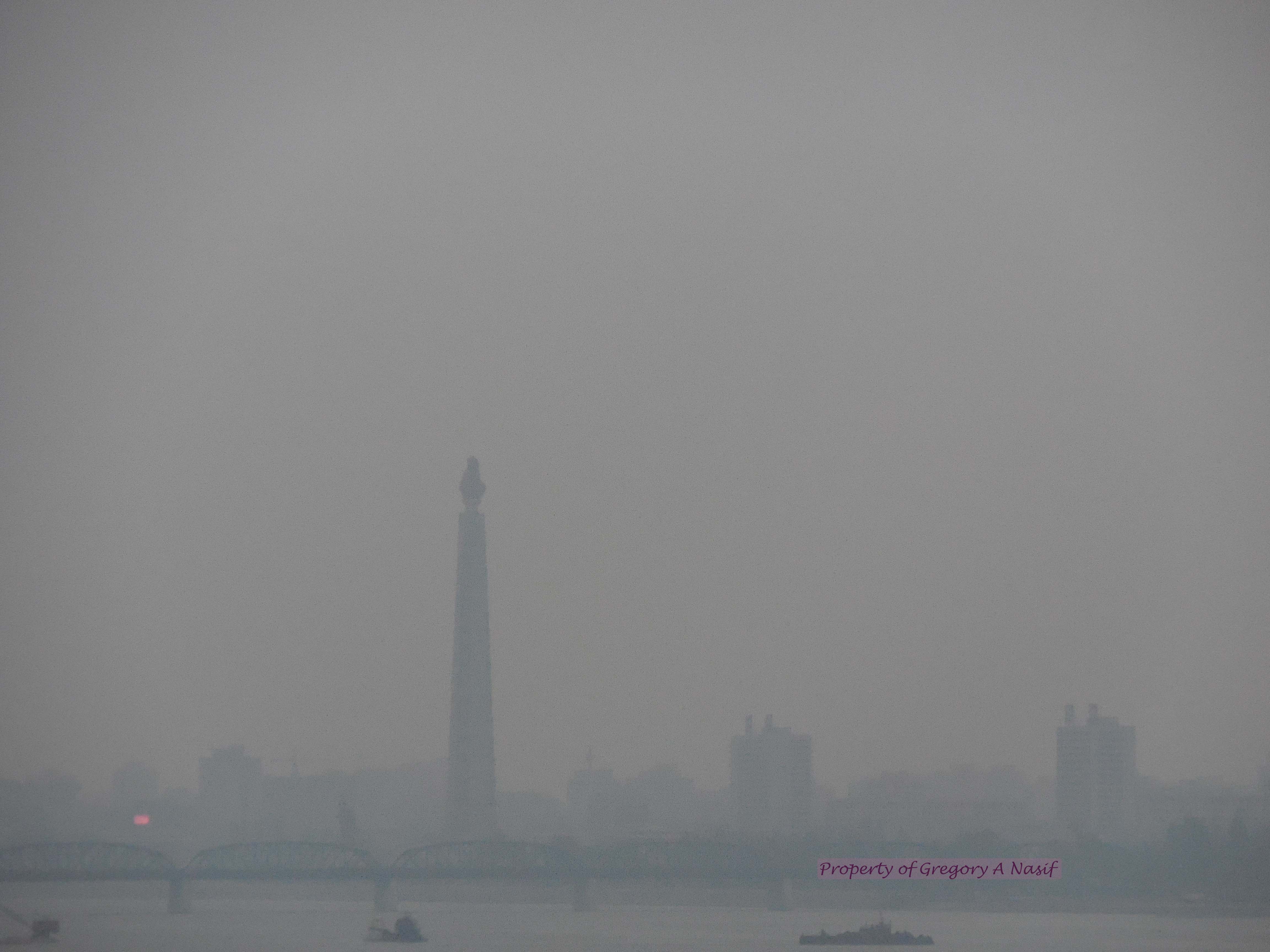


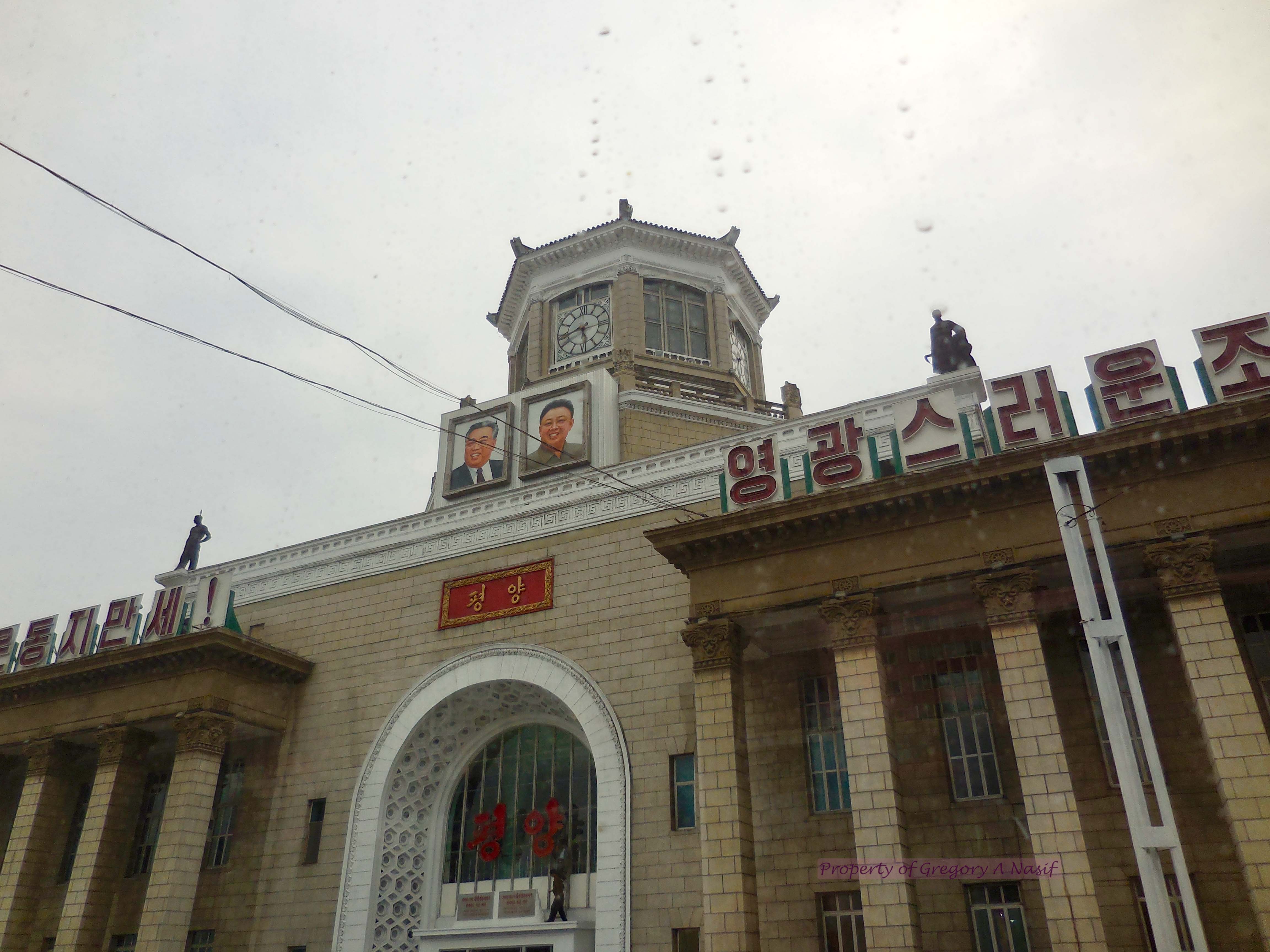
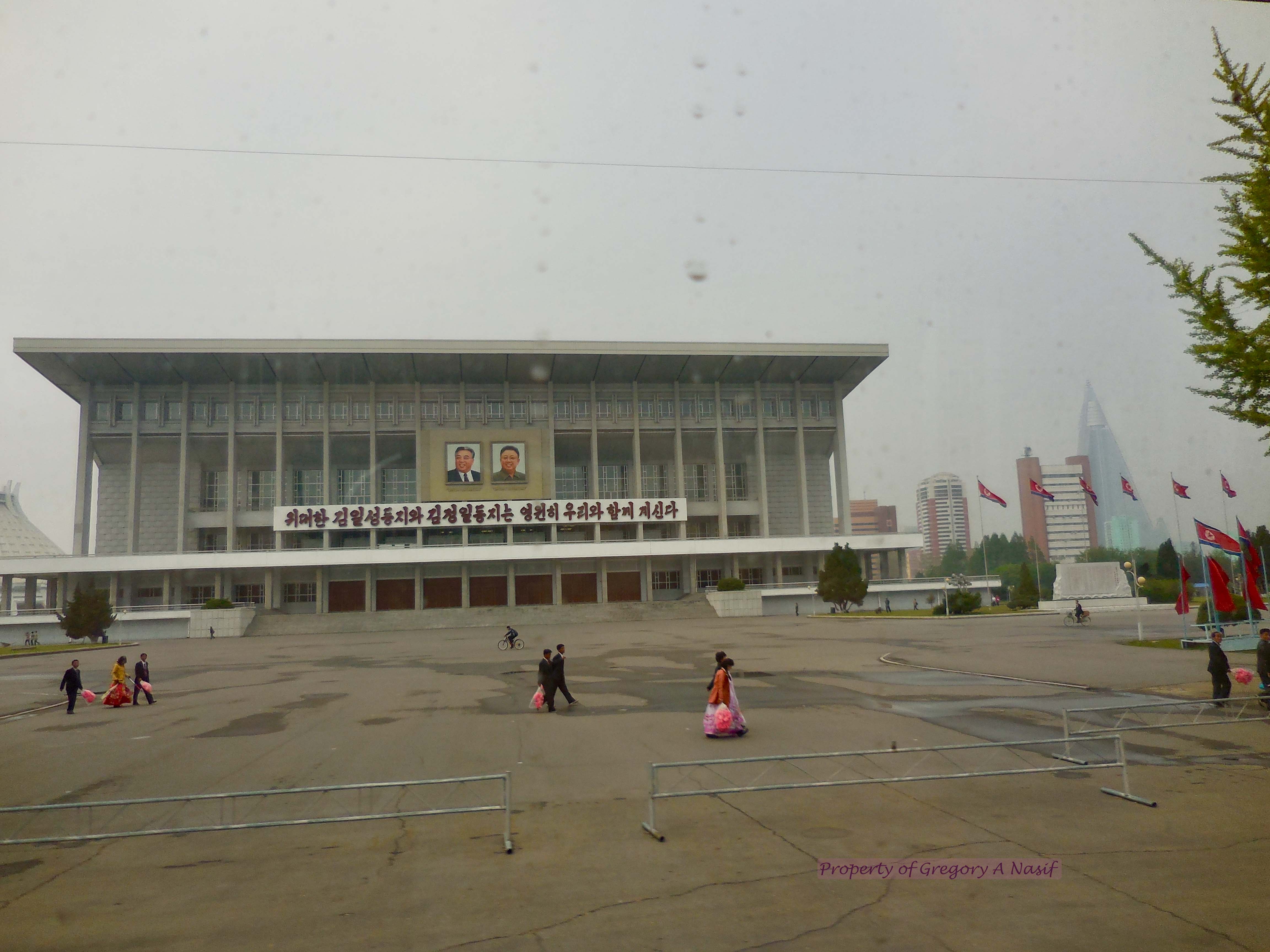
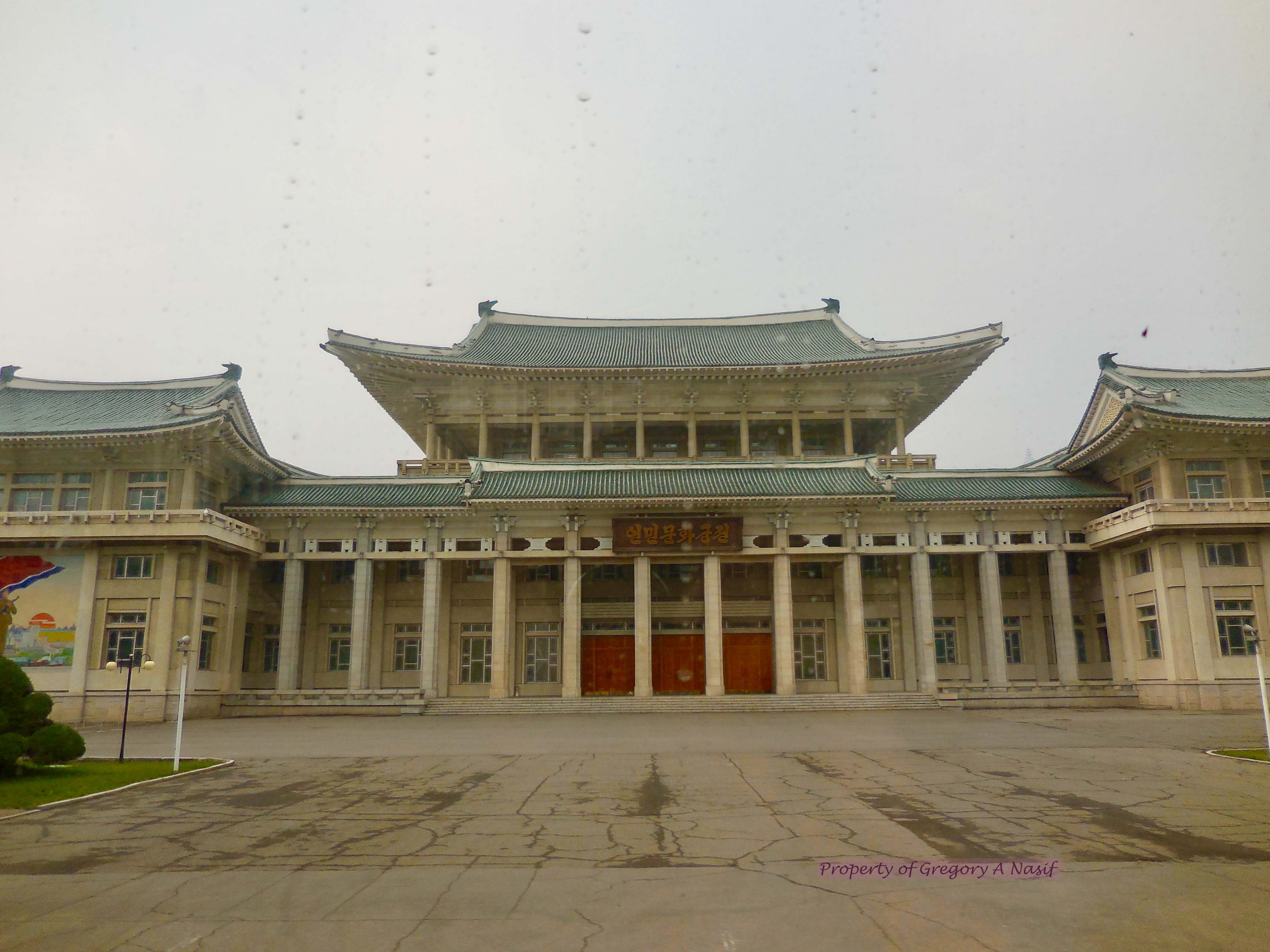


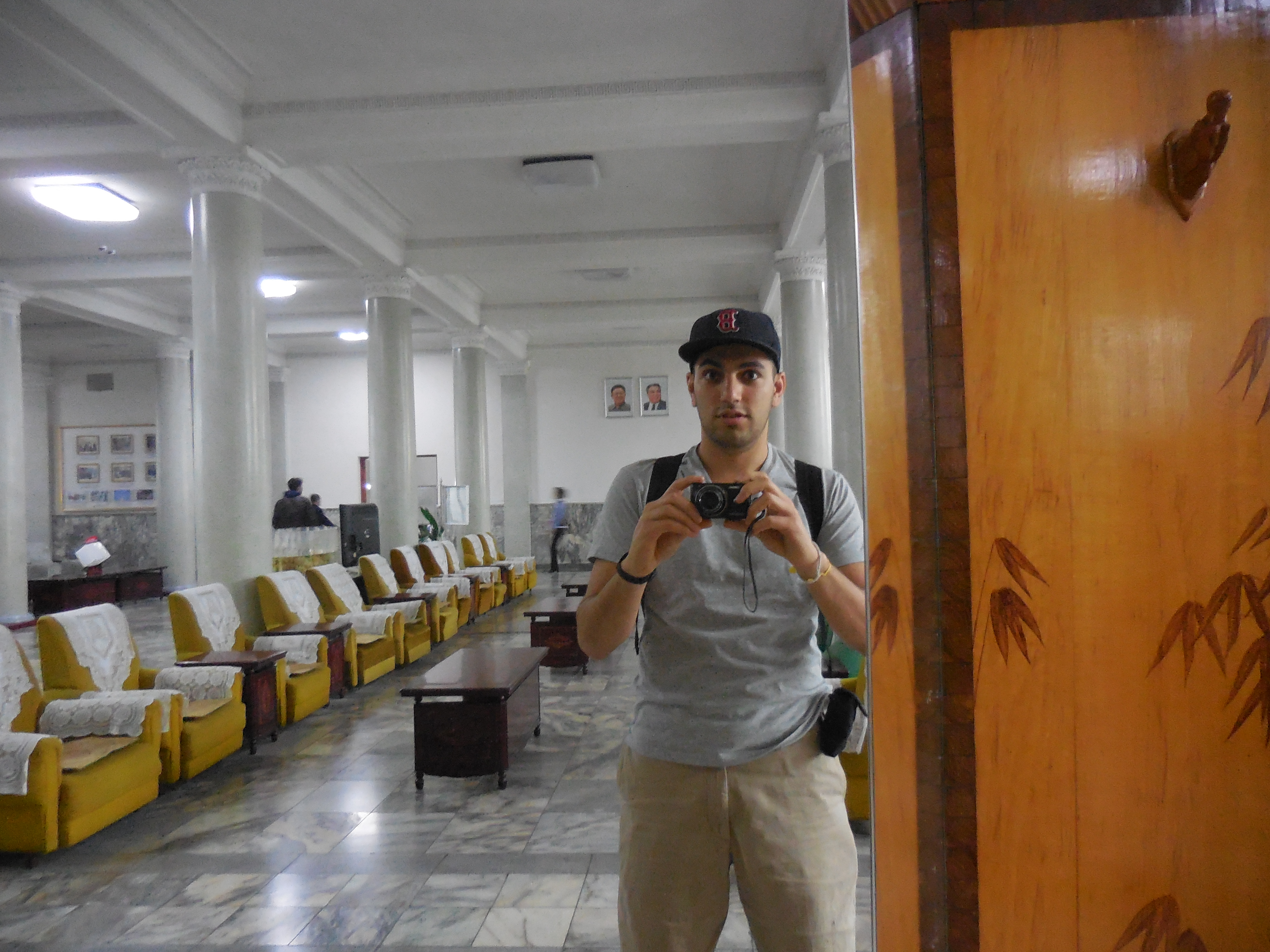
All photos property of Gregory A Nasif
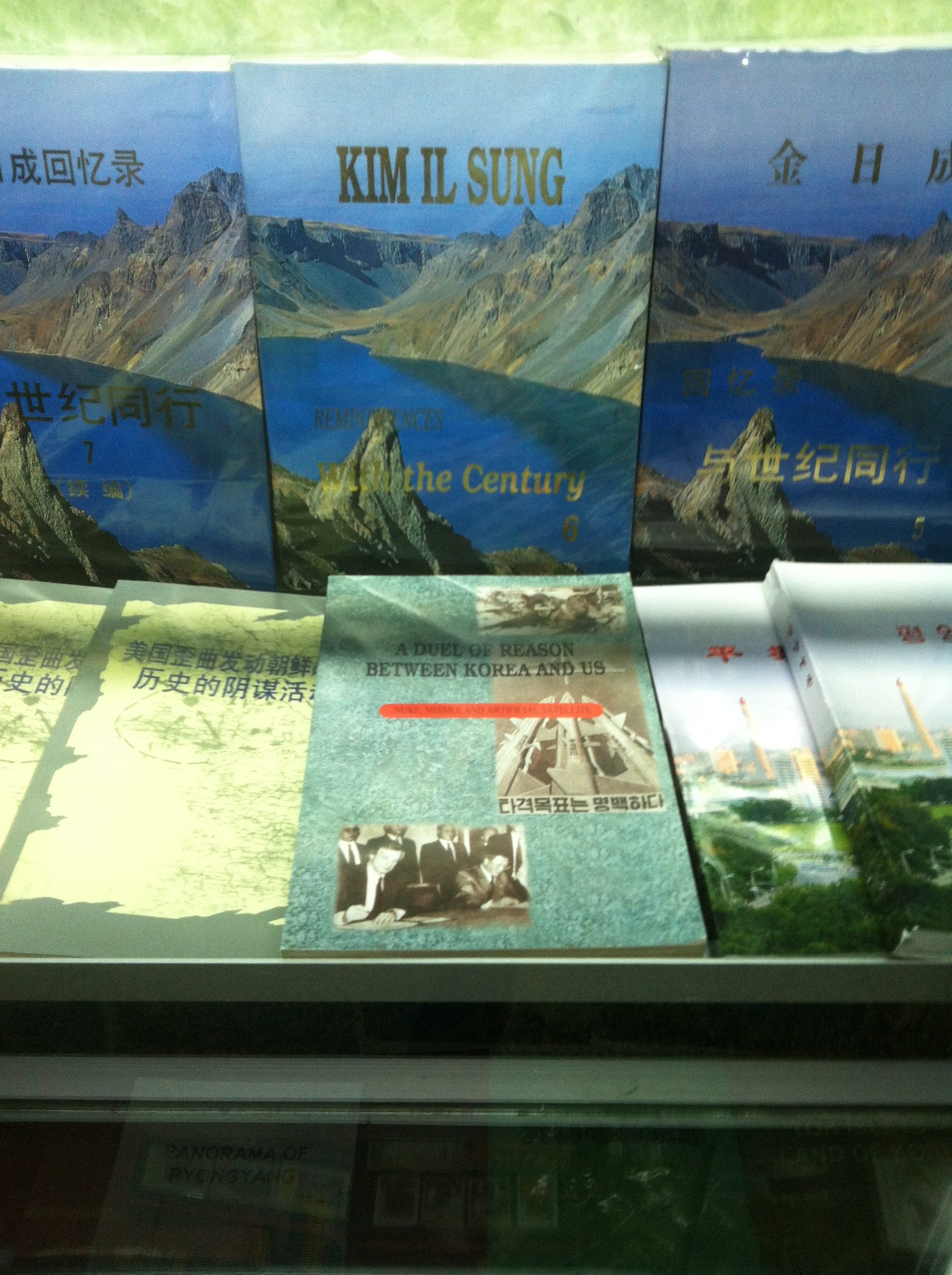
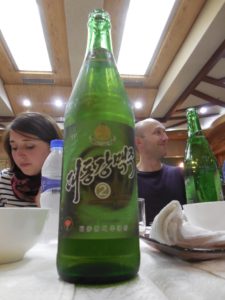
Great stuff thanks for sharing